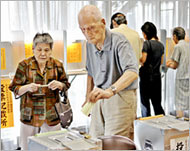Japan combats industrial espionage
It often begins in a bar – a casual greeting as two strangers wait for their drinks. A conversation is struck up, handshakes and business cards exchanged. But one of these two men, usually a specialist engineer, is unaware he is a target.

The man opposite him is already assessing how hard – or easy – it will be to get him to reveal the valuable secrets he carries in his head, and for what price.
Industrial espionage and trading of technology secrets is becoming so commonplace in Japan that a new law is being drawn up in an attempt to halt the steady outflow of knowledge to the country’s regional competitors.
Highlighting the issue, the Tokyo Metropolitan Police revealed late last year that a member of Russia’s trade mission to Japan paid ¥910,000 ($7,900) to an employee of a Toshiba subsidiary over a period of eight months for data on semiconductors.
Russian officials in Tokyo refused to talk to Aljazeera.net about the Japanese allegations.
Protecting intellectual property
In an attempt to stem the outflow of valuable technology, the Secretariat of Intellectual Property Strategic Headquarters, a body combating piracy chaired by Junichiro Koizumi, the prime minister, is drawing up a programme that it hopes will be enacted into law soon.
|
|
|
Some believe Japan’s greying |
“Protection of intellectual property is a serious problem in Japan and we hope this very comprehensive proposal will reduce the threat to Japanese companies,” a spokesman for the secretariat told Aljazeera.net.
“It would be inappropriate for me to comment on which countries are most active in this area and we are not even sure of the scale of the problem because Japan’s economy is so large and diverse,” he admitted.
The incident is the fifth time since 1989 that Japanese police have investigated industrial espionage involving Russia’s trade delegation in Tokyo.
Missile technology
In a 2002 case, a trade representative attempted to buy classified missile technology from a member of Japan’s Self-Defence Forces.
According to the police, the man pretended to be an Italian consultant when he first approached the Toshiba employee, who has neither been named nor charged with a crime.
“The man told me he was from a different country and said his job was related to business consulting,” the Toshiba employee was quoted as telling police. “I later thought something was strange because he asked for documents that I thought were unnecessary for his job.
“I spent the money on having fun,” he said.
The Russian man left Japan in June – before the allegations became public – and the National Police Agency has issued orders that he not be allowed to re-enter the country.
The devices reportedly have applications in advanced fighter aircraft, missile guidance systems and submarines.
Grey area
Japan’s demographics may be part of the problem.
Mike O’Keefe, managing director of risk consultants Kroll Japan, says that Japan’s labour force is greying, with a lot of engineers approaching retirement age who do not see much in the way of retirement pay awaiting them.
|
“Some of them take early retirement and get straight on a plane to China to assist one of Japan’s competitors; some don’t even wait for retirement but go over for the weekend to share what they know” Mike O’Keefe, managing director of risk consultants Kroll Japan |
“Some of them take early retirement and get straight on a plane to China to assist one of Japan’s competitors; some don’t even wait for retirement but go over for the weekend to share what they know,” he said.
Toshiba officials, however, dismissed the capabilities and value of the semiconductors allegedly sought by the Russian spy.
“Discrete semiconductors are simple, functional devices such as transistors and diodes, widely used in colour TVs and other home appliances,” company official Keisuke Oomori said in a statement.
“It did not include such advanced technologies, products and services that require export licences under Japan’s Foreign Exchange and Foreign Trade Control Law,” he said.
Said O’Keefe: “Everyone wants high-tech secrets and protecting them is a challenge, especially when security in Japan is not very high.”
Social engineering
And even if physical security is stiff around factories and research centres, those are not the sort of places that the data thieves go shopping for their wares.
“Smash-and-grab type thefts are very rare because it is hard to find out where protected data is going to be stored,” he said.
“The typical way is what is called ‘social engineering’; becoming friends with a man in a targeted research group, going to dinner and drinks and talking.
“It is also rare for blackmail to be involved because monetary considerations usually suffice,” he added.
Knowledge and know-how that are sought-after run from the advanced skills needed to make computer chips to the most cost-effective means of polishing silicon wafers or getting hold of a strain of bacteria that is used in a specific process.
“China wants to catch up because right now it is where Japan was 20 or 30 years ago,” O’Keefe said. “It is very much in awe of technological leaders and believes it has the right to catch up on people who were its abusers in the past by any means.”
Japan invaded China in 1937 and is blamed for the massacre of as many as 300,000 civilians in the eastern city of Nanjin.
